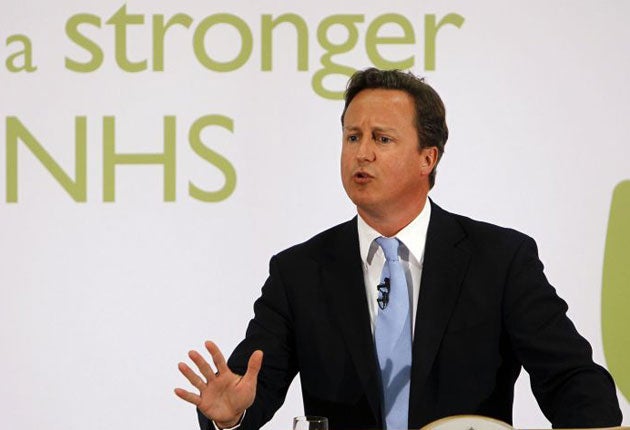David Cameron sets out NHS reform changes

David Cameron set out the first significant changes to the Government's controversial NHS reforms today as he admitted ministers had "learnt a lot" in recent weeks.
The Prime Minister insisted many people had changed their minds and a "significant number" were now on board with "the thrust" of the proposals.
But, in a speech to NHS staff in London, he admitted there were areas of the reforms that needed to change and said:
:: Hospital doctors and nurses - not just GPs - would now be involved in commissioning;
:: "Clinical senates" would bring together healthcare professionals to oversee the integration of care over wide areas;
:: The health regulator Monitor would have a duty to promote integration.
Acknowledging widespread concerns about the Health and Social Care Bill, Mr Cameron promised there would be no "selling off" of the NHS, that waiting times would be kept under control and that competition would only be used as a means to improving services.
The Prime Minister said there had been an "important debate" over the past two months which had led to "a whole range of people" changing their views.
"Before the pause, many were claiming the NHS is fine, and telling us not to touch it," he said.
"Now - whatever their views about how to do it, most agree that change is needed.
"What's more, a significant number are now more clearly on board with the thrust of what we are proposing.
He added that the Government had "learnt a lot about how to make our plans better".
"Now, of course some people ask why didn't we get everything right at the beginning? I don't see any point in being too defensive on this.
"I know other governments would announce reforms, and just plough on regardless of the concerns people had for fear of appearing indecisive or worrying about admitting something could be improved.
"And I know that the media with their deadlines want everything fixed in 24 hours. But this is too important to get wrong. So I think it is right that we took some time."
Speaking at University College London Hospitals, Mr Cameron acknowledged that the duty on Monitor to promote competition could be "misinterpreted" as set out in the current legislation.
But he insisted that it would only use competition as a means to "protect and promote the interests of people who use health care services".
"It will be tasked with creating a genuine level playing field, so the best providers flourish and patients get a real choice," he said.
There would be "fair competition" and no "cherry picking", he said.
Local commissioning would only go ahead when individual GPs are ready. Commissioning work would be overseen nationally by the NHS Commissioning Board to ensure consistency across the country.
Mr Cameron said the Government would not break up "efficient and integrated" care but improve it.
"That means making changes to our current proposals. Hospital doctors and nurses will be involved in clinical commissioning," he said.
"We will also introduce clinical senates where groups of doctors and healthcare professionals come together to take an overview of the integration of care across a wide area.
"And of course, where effective networks of clinicians already exist, we will support them, not reinvent the wheel.
"Monitor will now have a new duty to support the integration of services - whether that's between primary and secondary care, mental and physical care, or health and social care."
Amid criticism from Labour about the abolition of waiting time targets, Mr Cameron insisted they would be kept under control.
"Waiting times really matter. Yes, we'll continue to measure how long people are kept waiting in A&E. Nurses and doctors said we should - and that's what we're doing," he said.
"But the difference is that we're going to measure outcomes too, like re-attendance rates for the same problem.
"A rigorous, relentless focus on the things that people really care about and that a good health service is all about - great outcomes and a great service.
"So that's what our changes will now secure: Waiting times kept low. A focus on outcomes. A rounded view of what good healthcare means."
The Prime Minister also pledged, as part of five "guarantees", that there would be no cuts in NHS spending.
"We will not endanger universal coverage - we will make sure it remains a National Health Service," he said.
"We will not break up or hinder efficient and integrated care - we will improve it. We will not lose control of waiting times - we will ensure they are kept low. We will not cut spending on the NHS - we will increase it.
"And if you're worried that we are going to sell off the NHS and create some American-style private system - we will not. We will ensure competition benefits patients.
"These are my five guarantees. Guarantees you can hold me to and that I will be personally accountable for."
Mr Cameron was asked after his speech at the National Hospital for Neurology and Neurosurgery - part of UCL Hospitals - whether he feared he had lost public trust over health care.
He replied: "I have a very consistent record as someone who is a huge fan of the NHS. As a politician, as a father and as a parent, I want what is best for the NHS.
"I don't believe standing still and doing nothing is the right answer for the NHS. I think we would be overwhelmed by the costs that come through as the population ages and new drugs and treatments come on stream.
"Reform is necessary but I am absolutely determined we get it right."
Join our commenting forum
Join thought-provoking conversations, follow other Independent readers and see their replies
Comments
Bookmark popover
Removed from bookmarks